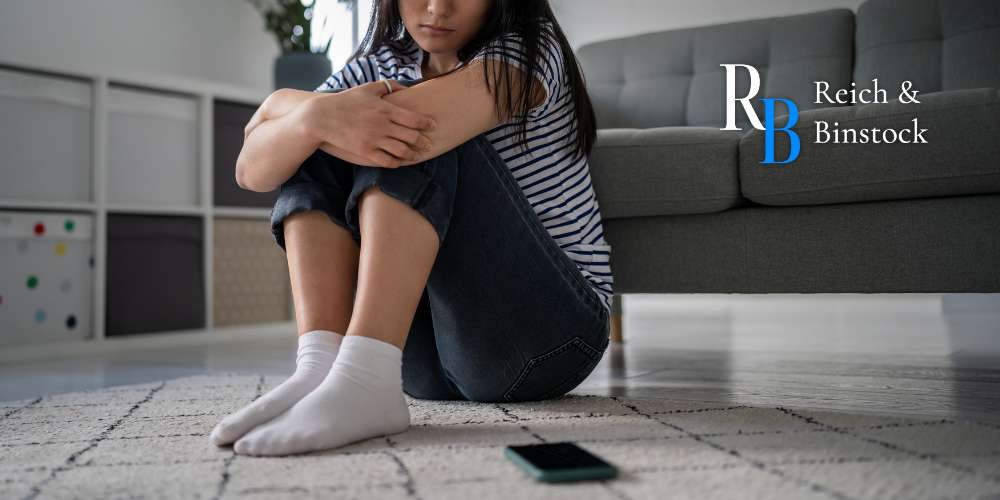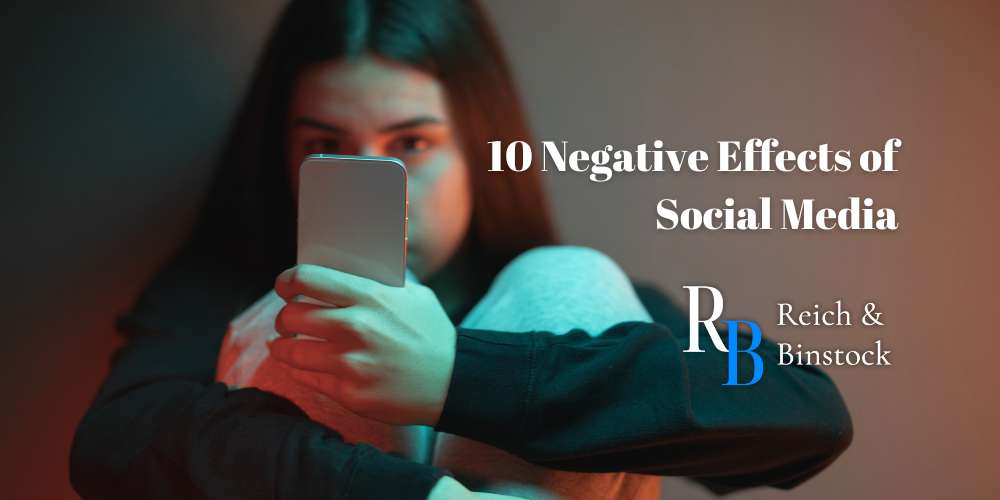In today’s digital age, social media has become an integral part of many people’s daily lives, allowing for instant access to entertainment, information, and social connections at all hours of the day. Despite the numerous positive aspects of social media, these sites can have a serious negative effect on the lives and minds of users, especially younger and more impressionable ones.
Below, we’ll go into detail about the different kinds of negative effects social media can have on young people, as well as what you can do if your child has suffered from physical, mental, and emotional damage as a result of these platforms.
If you or your loved one has suffered harm as a result of social media, you may be able to take legal action against the company that owns the platform. The Houston social media addiction attorneys at Reich & Binstock are prepared to help victims of social media to seek justice for their losses, including medical expenses, therapy bills, emotional distress, and more.
Start your journey towards justice–call (713) 622-7271 to schedule a free consultation with a legal professional on our team.
What Is Social Media?

“Social media” refers to any online platform that encourages social interaction and content sharing. Most social media sites allow users to post text, images, videos, or other types of multimedia content, while also allowing others to like, comment, and share this content with friends and followers. Some of the most popular social media platforms include Facebook, Instagram, Twitter, and TikTok.
What Is the Significance of Social Media Usage in Daily Life?
Social media has become an integral part of our society, often dictating how people communicate with others, stay informed on current events, and keep themselves entertained. Social media platforms have also become essential tools for self-expression, social validation, and community-building, making social media use feel like it’s a necessary part of daily life.
However, these platforms are owned by private companies that are motivated by profit, using their sites and the content generated by their users to generate revenue. This has led many social media companies to make changes to their platforms that maximize things like engagement and screen time, often at the expense of the physical and mental well-being of users.
The pervasiveness of social media draws users in, the design of these platforms keeps them online, and the constant influx of new content has them constantly coming back for more. When this formula generates revenue for a social media company, it’s unlikely that they’ll change their strategy, even when it has a negative effect on the people they’re profiting off of.
How Can Social Media Affect Relationships?

Social media can significantly impact relationships by both enhancing and straining them. On one hand, it offers convenient ways to stay in touch and share experiences with others, which can strengthen and even create real-life connections. According to statistics from The Pew Research Center, a majority of individuals cite “staying in touch with family and friends” as a major reason why they use social media.
However, the addictive nature of these platforms can keep people online for extended periods, preventing them from engaging with others outside of social media. This can lead to social isolation from individuals who don’t use social media or who simply don’t engage with others on social platforms as frequently.
Additionally, the exposure to constant, on-demand human interaction can make users averse to in-person connection, which people have less direct control over. It can be hard to walk away from a conversation with someone in public or at work, but it can be easy to block accounts or mute notifications on a social media app.
Also, many social media apps make it incredibly easy for people to harm others, giving people the ability to say and do almost anything from behind a screen, which can protect them from real-life consequences. Social media users may foster relationships with people they think they can trust, which may cause them to become victims of cyberbullying or even abuse, affecting their ability to form relationships with others in the future.
What Are the Most Popular Social Media Platforms?
As of now, some of the most popular social media platforms include Facebook, Instagram, Twitter, LinkedIn, TikTok, Snapchat, and Pinterest. Each platform caters to different demographics and interests, and offers users different forms of content sharing and user interaction.
What Are the 10 Negative Effects of Social Media on Young People?

While social media can be a great source of entertainment and can foster a sense of community among young people, these platforms can negatively impact the health and wellness of their most vulnerable users. Below are 10 of the most detrimental effects social media can have on children, teens, and younger adults.
1. Cyberbullying
Social media platforms can be breeding grounds for bullying and harassment, which can severely impact younger users. The anonymity (or perceived anonymity) of these platforms can provide online bullies with a sense of security, allowing them to say and do hateful things without the threat of immediate consequences.
While older people tend to ignore this kind of behavior, younger users are much more likely to be hurt by cyberbullying, and may take hurtful comments and negative posts to heart. This can lead to emotional distress, anxiety, depression, lower self-esteem, and even suicidal ideation.
2. Inappropriate Content
While social media apps often have different kinds of content filters and parental controls, there are plenty of ways that users can work around these roadblocks. This can allow violent, explicit, and harmful content to appear on a child’s social media feed, exposing them to inappropriate imagery at a young age. This exposure can then desensitize them to negative behaviors, distort their perception of reality, and cause them to develop unhealthy attitudes and behaviors.
3. Mental Health Issues

Excessive use of social media has been linked to various mental health issues among young people, including social anxiety, depression, and low self-esteem. The constant comparison to others’ curated lifestyles, the exposure to harmful content, and the pressure to maintain an idealized online image can take a toll on anyone’s mental well-being, let alone a young person’s.
Additionally, the addictive nature of social media can disrupt sleep patterns, increase stress levels, and hinder real-life social interactions, further exacerbating any new or pre-existing mental health challenges.
4. Physical Health Issues
Social media use can also lead to a number of physical health issues. Excessive social media use can cause young people to live a more sedentary lifestyle, which can lead to reduced physical activity. Prolonged screen time can also contribute to issues such as obesity, eye strain, and poor posture.
Additionally, young people who experience poor mental health as a result of social media may engage in harmful physical activities, like self-harm or eating disorders.
5. FOMO
Social media allows people to have constant access to content, information, and social interactions, oftentimes prioritizing the relevancy of content over quality. This can give young people FOMO, or fear of missing out, on things like current events, trends, and online discussions.
This relentless pursuit of staying in the loop can lead to heightened stress levels, anxiety, and a sense of perpetual dissatisfaction with life, especially in younger social media users. Additionally, it can make teens and young adults feel socially disconnected from their peers when they can’t keep up with everything that’s happening online.
6. Body Image Issues

Many people misrepresent themselves on social platforms, curating their social media accounts in a way that makes it seem like they have a perfect body and perfect life. Additionally, edited photos, filters, and celebrity endorsements on social media can perpetuate unrealistic beauty standards.
Young people who are exposed to these idealized images experience body dissatisfaction, which can lead them to develop a negative body image or even an eating disorder. The pressure to conform to these standards may also lead to unhealthy behaviors such as excessive dieting, or may cause them to seek validation through likes and comments.
7. Mood Disorders and Unrealistic Expectations
Social media can cause young people to develop mood disorders like anxiety and depression, or can worsen any existing symptoms. This is oftentimes a direct result of the impossible and unrealistic expectations set by others on social media.
Constant exposure to these curated images and posts can make children and young adults develop unrealistic expectations for happiness, success, and fulfillment. Additionally, the pursuit of approval and validation from peers through likes and comments can cause young people to rely on external validation for their self-worth.
Additionally, the constant pressure to present a perfect façade can be emotionally exhausting, especially for younger people, which can contribute to the development of mood disorders.
8. Sleep Deprivation

Various social media platforms are designed to promote endless scrolling, where a user can scroll through endless amounts of content for hours and hours at a time. This can cause young people to stay on social media late into the night, which can cause sleep deprivation. Even when they’re not actively or passively scrolling through social media, push notifications can keep them awake and constantly coming back to look through their likes, comments, and messages.
Also, the blue light emitted by phone and computer screens can inhibit the body’s production of melatonin, a hormone that regulates sleep, which can make it difficult to fall asleep and stay asleep at night. This can negatively affect their mood, mental health, physical health, and cognitive function.
9. False Information
Social media platforms are fertile grounds for the rapid spread of false information, including rumors, hoaxes, and misinformation. Some young people may lack the critical thinking skills to discern credible sources from untrustworthy ones, which may cause them to consume and propagate false information unknowingly.
This can lead young people to be confused and misinformed on various topics, and may cause them to develop a distorted view of the world.
10. Social Media Addiction
While it may seem trivial, children and young adults can become addicted to social media, which can negatively affect many different aspects of their lives, as well as the lives of those around them. Design features on these apps, like variable rewards, push notifications, and endless feeds, can exploit psychological triggers and reinforce compulsive behavior.
This can cause users to constantly check social media throughout the day for a rush of dopamine, and can cause them to want to spend more and more time on social media each day. This kind of addiction can lead young people to spend an excessive amount of time on social media, further exposing them to things like cyberbullying, idealized versions of others, harmful content, and misinformation.
Adult users may be more aware of their social media habits and may be able to engage in a social media detox if they feel like they’re developing a problem. Younger people, on the other hand, may not have this level of self-control and may spend hours and hours on social media every day.
Social media companies have a responsibility to protect their users, but time and time again, they have prioritized profits over the well-being of their users, causing users to become addicted to their products. Luckily, victims of social media addiction can hold these companies responsible through product liability claims like social media addiction lawsuits. Contact the Houston product liability attorneys at Reich & Binstock to file your claim as soon as possible.
Who Qualifies for a Social Media Addiction Lawsuit?

In order to file a social media addiction lawsuit, you will need to meet a few eligibility requirements. You may qualify for a social media addiction lawsuit if you or your child:
- Has become addicted to one or more social media platforms
- Has experienced negative physical and/or mental health problems as a result of excessive use of these platforms
- Were under the age of 25 when the addiction began
If you’re still unsure about whether or not you qualify for a social media addiction lawsuit, a product liability lawyer can investigate your case and determine whether or not you’re eligible to file a claim.
Contact Reich & Binstock Today to File a Social Media Addiction Claim

Social media can have a serious impact on a child’s life, and can destroy their mental health, sense of self-worth, and ability to interact with others. If you or your child has suffered harm or injury as a result of social media use, you may be able to seek compensation for your losses through a social media addiction lawsuit.
At Reich & Binstock, we’re proud to represent victims of social media addiction and help them seek compensation for their losses. We understand the devastating impact that social media addiction can have on people, and we are committed to fighting for justice and fair compensation on behalf of victims.
Contact us at (713) 622-7271 or reach out to us online and schedule a free initial consultation with a Texas social media attorney at Reich & Binstock today.














